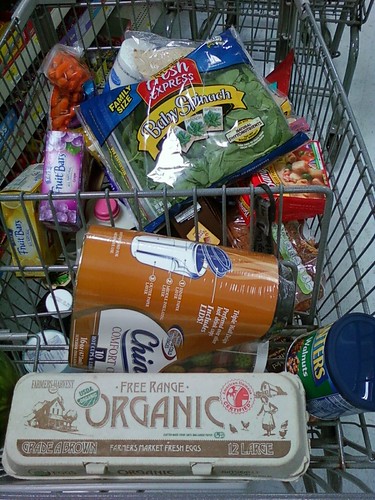CC Image Courtesy of Stephen Cummings on Flickr
The Washington, D.C., area is expecting a major snow storm this weekend. All reports I've heard point to major overcrowding and supply shortages at local grocery stores ahead of the storm. The Whole Foods near Logan Circle was closed for 30 minutes because the crowds were causing fire safety concerns, reports the Washington Post.
In theory, the grocery stores don't need to be chaos before storms. When demand exceeds supply, the price level rises until enough people don't want the good at the higher price. The most price-sensitive people buy other things or wait for the price to fall. Stores could have a policy of hiking prices 20% ahead of major disaster periods, for instance. However, for political reasons and for fear of customer backlash, they may choose not to (we saw what happened with the 5 cent bag fee). If you don't really need to go shopping, you'll wait until next weekend. If your cupboards are bare, you'll be willing to pay the premium.
Instead, the scarce good that is space in the grocery store is allocated by time wasted waiting in line. Again, only those who really need groceries today will be willing to bear the lines.
Which is the better way to sort customers? Economists generally prefer the former method. If customers have to pay a premium, they might as well do so in money instead of time. At least the higher prices transfer money to the stores and the local government (via sales taxes), and the higher prices (in the long run) induce more firms to provide the scarce good. In contrast, if people have to wait in long lines, that doesn't do anyone any good and is a waste of resources.
However, both methods create a sort of economic efficiency, by getting the goods to the people who most need them, and who are willing to "pay" the most, whether it be in time or money. But note that, to some people, time is relatively more expensive than it is for others. So the final allocation won't quite be the same.

5 comments:
I don't think that both methods do create an economic efficiency, because the "first come first serve" model inevitably leads to a shortage, so that the people at the back of the line end up paying a huge amount of time in order to get nothing.
Unlike in the gas shortage example we learned about in class, I don't think that "ending up with nothing" is as much of a possibility here.
It doesn't take very long to fit through the crowds to see if the shelves are mostly bare. You're not going to stand in a long checkout line to buy nothing.
And if you really, truly need groceries that day, you will "pay" the additional cost of going to another store in the area until you find what you need. Or you'll settle for some food, any food, instead of the particular items you were looking for.
Fair enough, I hadn't considered the order of events properly--unlike gas stations, in a grocery store you get your stuff before you get in line.
Though yesterday there was apparently a line out of the Whole Foods on P st NW just to get into the store.
Lines aside, I think that what happens by not raising the price is that they end up running out, something that they could avoid if they raised the price to meet the sudden short-term increase in demand. It would force people to ration would they get more carefully (like, does the first person to get there really need five loaves of bread just because he was overly anxious? A higher price would force him to think more carefully about that, leaving more loaves for other people).
You've got a very good point about the early birds not having any incentive to save food for the people who come after them.
But I think if you really needed food, you aren't going to wait until 10 p.m. to show up.
It's a fair point.
Post a Comment